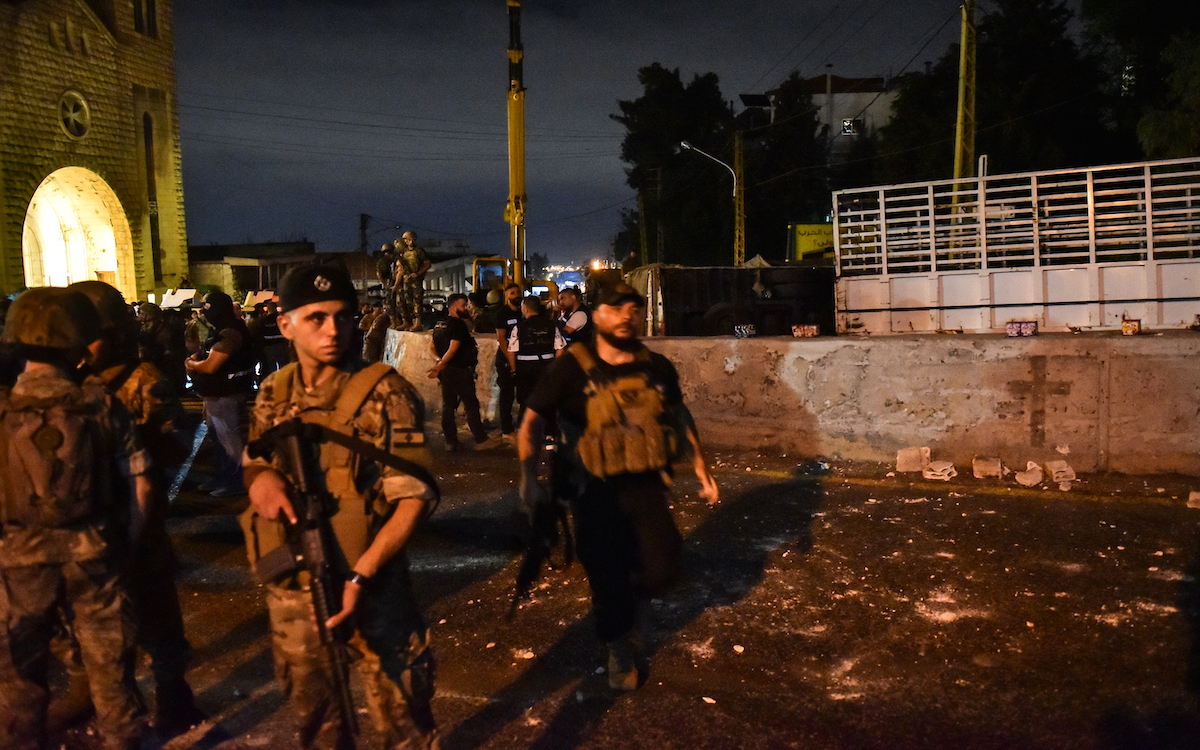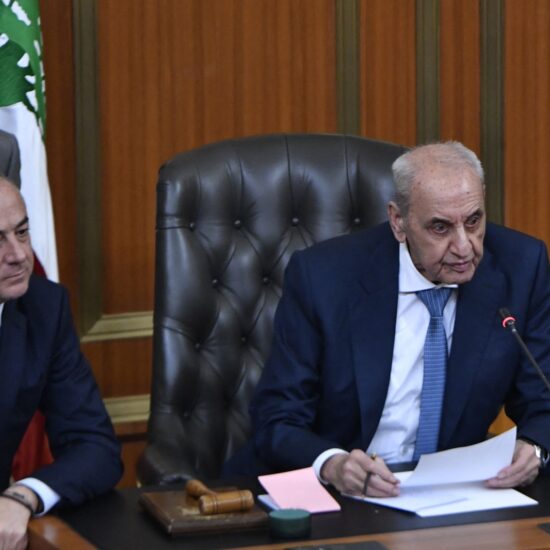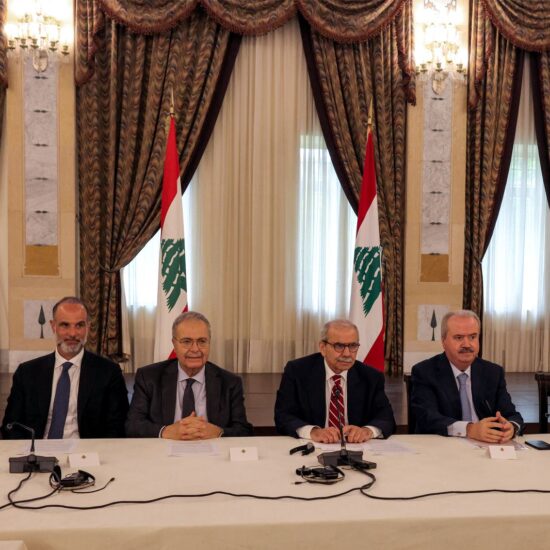
When a truck toppled over in the village of Kahaleh, many thought that this was just another traffic accident, which, with some very dangerous roads, are common throughout Lebanon. But when armed men, in civilian clothing, quickly formed a perimeter around the truck and forced back concerned villagers who were looking to come to the aid of the truck’s passengers, it became clear that this was not just any normal truck: it belonged to Hezbollah.
…shooting. Two people were reportedly killed in clashes that ensued, one of which is believed to be a #Hezbollah member and the other from the village. A third person was wounded. These two videos show the armed men blocking off the area and the continued shooting in the area. pic.twitter.com/Jv5BCcRRK8
— Nicholas Frakes | نيكولاس فريكس (@nicfrakesjourno) August 9, 2023
Then the shooting started.
Armed individuals from the village and the Hezbollah men traded fire in the street, resulting in the deaths of Fadi Bejjani, a resident of Kahaleh, and Ahmed Qassass, a Hezbollah soldier.
This video shows the clashes that took place between #Hezbollah and members of the #Kahaleh village earlier this evening. #حزب_الله #الكحالة pic.twitter.com/x6IqIhvU1r
— Nicholas Frakes | نيكولاس فريكس (@nicfrakesjourno) August 9, 2023
While Hezbollah was quick to acknowledge the incident and claimed ownership of the truck, they denied that they had instigated the fighting, arguing that their people only responded with fire when they were fired upon.
This claim is hotly disputed by the village residents who said that the Hezbollah men were aggressive from the start.
The response throughout Lebanon was quick and fierce.
Samy Gemayel, head of the Kataeb Party, condemned Hezbollah’s actions and referred to the party’s possession of weapons outside of the country’s national army as an existential threat to Lebanon.
Even Caesar Abi Khalil, an MP with the Free Patriotic Movement which had previously been a close ally of Hezbollah, expressed disappointment in Hezbollah’s reaction and response to the violence, saying that their statement “contradicts the truth.”
Since the initial aftermath, there have been increased calls for Hezbollah to disarm, or at least calling their weapons a threat to the country.
Relations between Hezbollah and the Christian community have been fraught over the years to say the least, even with former President Michel Aoun and the FPM lending Hezbollah some Christian legitimacy.
However, what happened in Kahaleh marks a new low in that relationship and arguably ensures that Christians in Lebanon will never view Hezbollah with legitimacy.
While tensions and fears of another civil war have calmed, the anger experienced by Christians in Lebanon towards Hezbollah remains, making the rope that the Iran-backed party is walking on that much thinner as relationships and tensions are pushed to the brink.
The army itself could soon be in the hot seat due to its intervention in Kahaleh.
While initially unable to enter the village due to Hezbollah, according to residents, the army was eventually able to enter and return calm to the area and took control of the fallen truck.
After removing the truck from the area, the army stated that it was filled with ammunition and, in a statement about the incident, did not name Hezbollah as one of the participants.
In addition to this, while the army denied that it would turn the ammunition back over to Hezbollah, a Hezbollah spokesperson stated that they expected to get the cargo back soon.
With the US Congress getting ready to vote on whether or not the Lebanese army should continue to receive subsidies, this recent incident could put this into question.
In Lebanon
Salameh sanctioned: On Thursday, August 10, the United States, United Kingdom and Canada all announced sanctions against former Central Bank Governor Riad Salameh.
The #US issued sanctions for Riad Salameh, son Nady, brother Raja, former assistant Marianne Hoayek and Rana’s former partner Anna Koskova. There was talk for a while that the US was going to sanction #Lebanon’s former Central Bank governor. #لبنان #عقوبات https://t.co/4ZuBBOqpWK
— Nicholas Frakes | نيكولاس فريكس (@nicfrakesjourno) August 10, 2023
The sanctions came less than two weeks since Salameh’s 30-year tenure as head of BDL came to an end.
There had been talk for months that foreign sanctions were being discussed and planned against Salameh but they were waiting for Salameh to leave office as to not complicate the situation in Lebanon and BDL by having its head under international sanctions.
Salameh is also facing investigation in Lebanon, France, Germany, Luxembourg, and Switzerland for alleged financial crimes.
Mismanaged: A forensic audit by the consulting firm Alvarez & Marsal released a scathing forensic report of the mismanagement at BDL that took specific note of Salameh’s “personalized” and “unscrutinized” approach to heading the central bank.
The report looks at the time period from 2015 to 2020 and noted the irregular accounting practices at BDL, along with illegitimate commissions that totaled upwards of $111 million.
The report also criticized the lack of good governance and risk management at the central bank, and found that BDL went from having a foreign currency surplus of around $7.2 billion in 2015 to a deficit of around $50.7 billion by 2020.
After Wassim Manouri, the first deputy governor of BDL, took over the central bank following Salameh’s departure, he moved to correct the mistakes at BDL, but only time will tell how successful he will be in his efforts.
Video evidence: When the body of Lebanese Forces activist in Bint Jbeil Elias Hasrouny was first discovered, his death was initially reported as the result of a car accident.
However, that no longer seems to be the case after video footage emerged depicting his car being boxed in by two other cars, after which occupants from one of the vehicles joined him in the car before they all drove off.
Now, it is widely believed that he was murdered.
Lebanon’s security forces have opened an investigation into the death, but high-profile killings in Lebanon have a tendency of going unsolved.
Attempted attack: An unknown person attempted to throw a Molotov cocktail at the Swedish Embassy in Beirut on Wednesday.
According to security officials, the “tail” of the firebomb failed to light so there was no damage done to the embassy.
This attempted attack comes after outrage after Sweden allowed for the burning of the Quran during protests.
No one has been arrested yet in connection to the attempted attack.
Burning the border: The Israeli army shot at an unknown individual on Sunday, August 13, after they reportedly threw a Molotov cocktail at the Lebanese-Israeli border, causing some material damage.
Israeli media reported that the individual was a member of Hezbollah.
Tensions have been tense along Lebanon’s southern border after Hezbollah pitched tents in the contested Shebaa Farms area.
Today marks the 17-year anniversary of the end of the devastating 2006 war between Hezbollah and Israel.
Temporary closure: Lebanon’s national television channel Télé Liban temporarily shut down as employees protest unpaid wages.
While the channel was only off air for less than a day, it called into question its future.
Information Minister Ziad Makary said that he had no intentions of shutting down Télé Liban.
Employees of the channel, like so many others, have seen their salaries slashed amid the economic crisis with Chef Antoine, the host of a popular cooking show on Télé Liban, telling the podcast Sarde after dinner that he is paid around $40 per month.
Burning hot: As the summer heat continues to rise, Lebanese are desperately trying to stay cool and avoid heat exhaustion and heat stroke.
At the same time, the heat is raising the risk of wildfires significantly.
Lebanon’s Civil Defense services are remaining on high alert given the rising temperatures, but the economic crisis has ensured that they are facing equipment shortages and depleted resources.
In October 2019, the government came under heavy criticism after a fire broke out and authorities could not use helicopters to help fight the fire because they had fallen into disrepair.
Presidential election update: Lebanon is still without a president.
It has been 294 days.
In the region
Attack in Iran: A gunman opened fire at a prominent Shiite shrine in Shiraz on Sunday, killing one and injuring eight others, marking the second attack on the same shrine in less than a year.
The gunman was detained by security forces but has offered no motivation for his actions.
No group has taken credit for the attack yet.
Shah Cheragh is one of Iran’s top five Shiite shrines that draws a steady flow of pilgrims throughout the year.
Free (sort of): Iran has released four American detainees from their detention at the notorious Evin Prison and put them under house arrest as the US and Iran appear to have reached an agreement on the mutual release of prisoners and locked Iranian funds in South Korea.
The funds, totaling $6 billion, will be put into an offshore account that Iran can only access to buy things like medicines and food.
This move is also seen as another step forward in the US and Iran reaching an informal agreement on Iran’s nuclear program – although any agreement remains some ways off.
US President Biden made a return to the Iran Nuclear Deal a hallmark of his presidential campaign in the 2020 election.
ISIS attack in Syria: The self-proclaimed Islamic State claimed responsibility for an attack in eastern Syria that killed 33 Syrian soldiers.
The ambush took place in the Deir Ezzor province and saw dozens of Syrian soldiers injured.
ISIS also claimed that they will continue to carry out attacks when they took credit for the ambush.
ISIS, which held territory as large as Britain, was territorially defeated in 2019 but maintains sleeper cells in both Iraq and Syria, in particular in provinces such as Deir Ezzor.
More strikes on Damascus: Israel once again struck alleged Iranian positions in the Syrian capital of Damascus on Sunday, August 13.
The strikes come one week after Israel struck alleged Iranian and Hezbollah positions – also in Damascus.
Israel routinely strikes what it claims are positions or weapon storage facilities belonging to Iran and Hezbollah in Syria.
Israel rarely acknowledges its role in such strikes.
10 years later: On August 14, 2013, hundreds of people were gunned down in Rabaa al-Adawiya Square in Egypt.
Government forces used live ammunition to disperse the anti-government sit-ins, which consisted of members of the Muslim Brotherhood who opposed the removal of Mohamed Morsi from the presidency, as well as everyday Egyptians who were against the military coup.
Rights groups say that over 8oo people were killed – making it one of the largest single killings of demonstrators anywhere in the world in recent history – while government tallies put the number at 624. The actual number is unlikely to ever be known.
Since then, Abdel Fatah al-Sisi has ruled Egypt, swiftly snuffing out any opposition to his rule.
Sending a message: Saudi Arabia has officially appointed its envoy to Jordan, Nayef al-Sudairi, to a joint role as envoy to both Jordan and Palestine.
The Jordanian ambassador has long unofficially held both roles, but this is the first time that the Saudis have formally acknowledged the role.
Israeli politicians dismissed the move as Saudi Arabia only going through the motions of publicly backing the Palestinian state, while Saudi and Palestinian analysts push back on this, arguing that this is a sign that Saudi Arabia is serious about securing the rights of the Palestinian people under occupation.
Israel is unlikely to allow Saudi Arabia to establish a consulate in East Jerusalem, the half of the holy city that Palestinians claim as their capital.
What we’re reading
The meaning of a word: Lebanese vlogger and photographer Fadi Boukaram first started gaining popularity during the coronavirus pandemic through videos where he discussed the origins of Arabic words. NOW’s Robert McKelvey spoke with Boukaram about his road trip throughout the US and his fascination with words.
Collateral damage: Public sector employees in Lebanon have struggled since the start of the economic crisis as their salaries have increasingly devalued. Maan Barazy argued that these employees are in a no-win situation as the foreign reserves are continuing to be drained.
Separated: The separation of people in public spaces based on their sex is technically illegal in Israel. However, The New York Times’s Roni Caryn Rabin found that Ultra-Orthodox members of Prime Minister Benjamin Netanyahu’s far-right coalition and looking to expand the powers of the rabbinical courts and prevent the mixing of sexes.
Religious protest: Ashoura is a solemn day for many Shiites around the world as they commemorate the death of Imam Hussein at the Battle of Karbala. In Iran, though, The New York Times’s Farnaz Fassihi, with photographs by Arash Khamooshi, wrote about how commemorators used the day as a way of protesting the government.
Lebanon+
Come on Barbie let’s go party (or not): The new Barbie film has proved to be a global sensation, even being shown in Saudi theaters, which did not exist at all a few years ago.
However, Lebanon’s caretaker culture minister, Mohammed Mortada, did not see the film fit to be shown in his country and requested that it be banned, arguing that it promoted homosexuality and was contrary to Lebanon’s values.
Upon reviewing the film, the committee in charge of censoring films in Lebanon said that they did not see anything in the film that justified a ban. It is not clear if the film will ultimately be banned or not.
The committee in charge of censoring films in #Lebanon reportedly watched #BARBIE this morning and found no reason to justify its ban. #لبنان #باربي https://t.co/4CIWxTOQP9
— Nicholas Frakes | نيكولاس فريكس (@nicfrakesjourno) August 11, 2023
This debate even sparked a small Twitter feud between Mortada and MP Mark Daou.
The Barbie film is the latest in the targeting of the LGBTQ+ community in Lebanon, which has become the most recent targets of populist rhetoric that aims to distract focus away from the dire situation in Lebanon.
Should the film be banned, Nadim Gemayel, an MP with Kataeb, said that they will play the film in public squares. It is not clear if that was just talk or if they actually plan on doing this.
يريدون منع عرض فيلم Barbie، بل يعرضون افلام قتل وجهاد لاطفال.
ثقافتنا ثقافة الحياة، ثقافتهم ثقافة الموت والارهاب، ثقافة حزب الله اخطر من سلاحه..
اذا تم منع عرض فيلم Barbie في صالات السينما، فسنعرضه في الساحات العامة في لبناننا وليمنعوه في دويلتهم.
لكم دويلتكم، لنا لبناننا…
— Nadim Gemayel (@nadimgemayel) August 13, 2023
Until next week, follow NOW Lebanon on Twitter, Instagram, Facebook, and LinkedIn. And stay safe!








